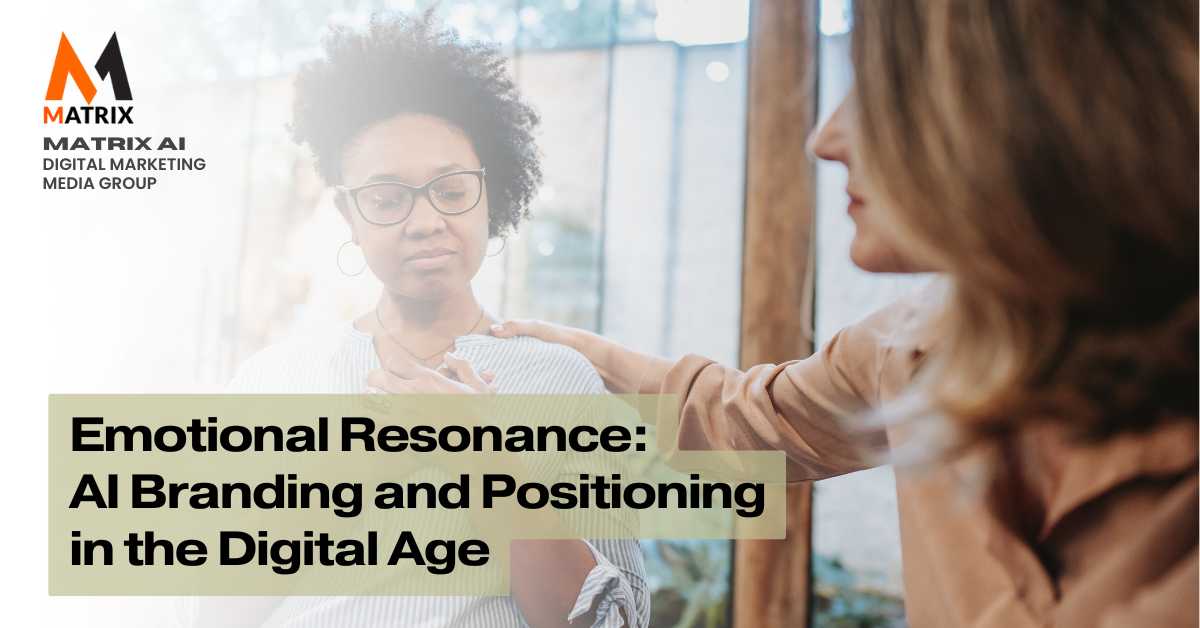Emotional Resonance: Crafting Impactful AI-Driven Branding in the Modern Digital Landscape
Did you know that 95% of purchasing decisions are driven by emotion?
In a world where consumers are bombarded with countless brand messages daily, connecting emotionally is more crucial than ever.
Enter AI—a transformative tool that can elevate your branding and positioning strategies by tapping into the emotional currents that drive consumer behavior.
Emotional resonance in branding is like the tuning fork of a grand piano. When struck, it vibrates at a frequency that not only creates a beautiful sound but also causes the strings of the piano to vibrate in harmony, amplifying the music.
Similarly, when a brand strikes the right emotional chord, it resonates deeply with its audience, amplifying the connection and creating a harmonious relationship beyond mere transactions.
Just as a well-tuned piano produces music that lingers in the mind long after the notes have faded, a brand that masters emotional resonance leaves a lasting impact that keeps customers coming back, moved by something more than just the product. 10 Most In-Demand Types of SEO Services to Focus On in 2025
AI’s Role in Emotional Branding

AI technologies, such as sentiment analysis and natural language processing, can analyze consumer emotions in real time, offering deep insights into what truly resonates with your audience.
Imagine being able to craft personalized marketing messages that not only speak to your customers’ needs but also align with their emotional states. This level of emotional intelligence allows brands to create more personalized, authentic, and engaging campaigns.
AI Can Improve Your Campaign ROI by 32% or More
Move from reactive marketing to proactive, data-driven decisions that deliver predictable growth. AI is the tool your competitors are already using to get ahead.
The Problem with Modern Marketing
Marketing has become a complex, data-saturated field where proving ROI is a constant struggle. These foundational cracks prevent teams from reaching their full potential.
Fragmented Data
Dozens of disconnected tools create a fractured view of the customer journey, making true personalization and attribution nearly impossible.
Slow Execution
Repetitive, manual tasks drain countless hours that could be dedicated to high-impact strategy and creativity, putting you at a disadvantage.
Nightmare Attribution
In a multi-channel world, inaccurate attribution leads to poor budget allocation and wasted spend on ineffective activities.
Rising CAC
As channels become saturated, the cost to acquire customers climbs, putting immense pressure on marketing to do more with less.
The Solution: A Transformation from Chaos to Clarity
The Chaos
Fragmented Data
Manual Processes
Guesswork & Ambiguity
Wasted Spend
The AI Engine
Data Unification
Intelligent Automation
Predictive Analytics
Hyper-Personalization
The Clarity
Unified Customer View
Strategic Focus
Data-Driven Decisions
Predictable ROI
The Proof is in the Numbers
AI isn’t just a concept; it’s a proven engine for growth. The data shows a clear and significant impact on key marketing metrics.
B2B Predictive Analytics
By implementing predictive AI to model complex sales cycles, B2B firms can precisely allocate budgets to the most effective channels, dramatically boosting returns.
Overall Marketing ROI Lift
Companies that effectively leverage AI across their marketing functions consistently outperform their peers, seeing a substantial increase in campaign efficiency and effectiveness.
Content Strategy Optimization
Using AI to analyze content strategy, Unilever saw a dual benefit: a significant reduction in production costs and a simultaneous increase in audience engagement.
E-commerce Revenue Generation
ASOS turned personalization into a core revenue driver. Their AI-powered recommendation engine is responsible for generating over a third of the company’s total revenue.
How It’s Done: The MatrixLabX AI System
This transformation is powered by MatrixLabX, the world’s first autonomous AI marketing system. It replaces fragmented tools with a suite of intelligent, self-optimizing agents called AIPads.
AI Content Creation
Publish content 10x faster while reducing production costs by up to 70% with AI-generated, high-performing assets.
AI SEO Automation
Automate keyword research, on-page optimization, and technical monitoring to improve search rankings and drive more organic traffic.
AI Sales Automation
Bridge the marketing-sales gap with intelligent lead scoring and automated nurturing to accelerate the entire sales cycle.
AI Ultra
Deploy a hyper-scale AI platform pre-trained with industry-expert intelligence for an immediate, verifiable competitive advantage.
Real-World Impact: Case Studies
Cadbury
32%
Spike in Engagement
Used generative AI to create over 2,500 unique, personalized video ads, creating a viral campaign that reached 140 million people.
Top B2B Companies
38%
Average Increase in ROI
Leveraged predictive AI to accurately attribute revenue and optimize budget allocation in long, complex sales cycles.
ASOS
35%
of Total Revenue
Implemented an AI-driven recommendation engine that has become a core, revenue-generating component of the customer experience.
Enhancing Customer Loyalty
Emotional resonance isn’t just about making a sale; it’s about building lasting relationships. AI can help brands identify and amplify the emotional triggers that foster loyalty and advocacy.
By analyzing customer interactions and feedback, AI can guide the creation of emotionally compelling content that reinforces positive brand associations. Consider a loyalty program that uses AI to send personalized thank-you messages, special offers, or even birthday greetings designed to make customers feel valued and understood.
Balancing Technology and Humanity
While AI can provide powerful tools for understanding and engaging with emotions, the human touch remains indispensable. The most successful brands use AI to augment, not replace, human creativity and empathy.
AI can handle the data-driven aspects of emotional resonance, but human marketers must infuse these insights with genuine creativity and heartfelt storytelling. This synergy between technology and humanity creates a more authentic and emotionally engaging brand experience.
In the digital age, emotional resonance is the key to standing out in a crowded marketplace. You can create more impactful branding and positioning strategies by leveraging AI to understand and engage with your audience on a deeper emotional level.
Balancing the precision of AI with the authenticity of human emotion is the secret to building lasting customer relationships and a truly resonant brand.
Emotional Resonance: AI Branding and Positioning

Introduction to Emotional Resonance
In the evolving landscape of artificial intelligence, emotional resonance has emerged as a pivotal element in branding and positioning strategies.
Emotional resonance refers to a brand’s ability to evoke strong emotional responses from its audience, fostering a deep, personal connection that transcends traditional marketing tactics. But how does AI fit into this emotionally charged equation? Content Translation Services: A Competitive Advantage for Your Business
AI’s Role in Crafting Emotional Connections
AI’s role in branding and positioning involves sophisticated data analysis, personalized interactions, and predictive modeling.
AI can analyze consumer behavior, preferences, and sentiments through machine learning algorithms, enabling brands to tailor their messages accurately. This personalized approach enhances customer experience and builds a loyal customer base that feels understood and valued.
Strategic Positioning with AI
Strategically positioning a brand using AIContentPad involves creating emotionally resonating narratives and experiences.
By leveraging AI-driven insights, companies can craft compelling stories that align with their target audience’s values and aspirations.
This emotional alignment is crucial in differentiating a brand in a crowded marketplace, making it memorable and impactful.
AI and Emotional Resonance
The fusion of emotional resonance with AI-driven branding and positioning is not just a trend but a transformative approach that promises to redefine how brands connect with consumers.
As AI technology advances, the potential for deeper, more meaningful brand-consumer relationships will only grow, sparking curiosity and excitement about the future of marketing.
SOV Comparison Tool
Analyze your Share of Voice and get actionable recommendations.
Understanding Emotional Resonance in AI Branding
The Intersection of Emotion and Technology
In today’s rapidly evolving digital landscape, where artificial intelligence is reshaping industries, emotional resonance in branding has never been more critical.
Content marketers are at the forefront of this transformation, tasked with weaving emotion into AI-driven narratives that captivate audiences. But why does emotional resonance matter now more than ever?
The Power of Connection
Consumers are increasingly inundated with information, so brands that evoke genuine emotional responses stand out.
Emotional resonance allows marketers to forge deeper connections with their audience, creating a sense of loyalty and trust. The human element remains irreplaceable in a world where AI can analyze data and predict trends.
Understanding the emotional triggers that drive consumer behavior can enhance brand positioning and elevate marketing strategies.
Crafting Authentic Experiences
As AI continues refining personalization, the challenge lies in ensuring these interactions feel authentic. Marketers must harness the power of storytelling, leveraging emotional resonance to create memorable experiences.
By tapping into their audience’s core emotions, brands can create compelling narratives that attract and retain customers. In this age of AI branding, the fusion of technology and emotion will define the future of successful marketing strategies.
Are you ready to explore how emotional resonance can transform your AI branding approach? Embrace the future of marketing where data meets empathy, and watch your brand thrive.
Emotional Resonance: AI Branding and Positioning
Understanding Emotional Resonance
Emotional resonance in branding refers to a brand’s ability to evoke feelings that connect deeply with its audience.
This concept takes on new significance in AI branding as businesses leverage technology to create personalized experiences that touch consumers emotionally.
By understanding and tapping into these feelings, brands can carve out a unique position in an increasingly crowded market.
The Power of Emotional Connection
For instance, consider a fitness app powered by AI. Rather than simply providing workout routines, it could analyze a user’s mood and previous activities and express goals to curate a personalized fitness journey.
If the app recognizes a user is feeling demotivated, it might send motivational messages or suggest lighter, fun workouts. This tailored approach fosters a sense of understanding and care, effectively deepening emotional resonance.
Engaging Storytelling
Moreover, successful brands often weave storytelling into their strategies. Take Nike, for example, which focuses on selling shoes and celebrating athletes’ struggles and triumphs.
Through AI, brands can analyze consumer stories and feedback to create campaigns that resonate emotionally, capturing the essence of their audience’s dreams and aspirations.
This storytelling positions the brand in the market and leaves a lasting impact on consumers.
Building Lasting Connections
Ultimately, leveraging emotional resonance in AI branding isn’t just about algorithms; it’s about creating genuine connections. Brands that can tap into their audience’s emotions enhance their positioning and cultivate loyalty and trust.
As the digital landscape evolves, harnessing this key concept will be crucial for brands that aim to thrive in consumers’ hearts and minds.
Emotional Resonance: AI Branding and Positioning
Transforming Customer Connection
Emotional resonance in branding is a potent tool that can transform a brand’s relationship with its customers.
For content marketers exploring AI-enabled branding and positioning, the primary advantage lies in creating highly personalized emotional connections.
Customers’ engagement and loyalty significantly increase when they perceive that a brand understands their feelings and needs.
Personalization through Data Insights
AI-driven tools can gather and analyze large datasets to understand consumer behavior and preferences in depth. By leveraging this data, content marketers can tailor their messaging to reflect their target audience’s emotional states and triggers.
A study by Epsilon found that 80% of consumers are more likely to purchase when brands offer personalized experiences. This underscores the effectiveness of AI in crafting emotionally resonant content that speaks directly to customers’ hearts.
Enhancing User Experience
Beyond just personalized messaging, AI-powered branding and positioning can enhance the overall user experience. Chatbots and virtual assistants, for instance, utilize natural language processing to interact with customers in a more human-like and empathetic manner.
This fosters a sense of connection and trust, making the brand feel more approachable and understanding. According to Gartner, by 2022, 70% of customer interactions will involve emerging technologies such as machine learning applications, chatbots, and mobile messaging.
By embedding emotional resonance into AI-driven branding strategies, content marketers draw in and retain an audience eager to engage with a brand that feels like it genuinely understands and values them.
This approach is about staying relevant and creating lasting emotional bonds that transform surface-level interest into deep-rooted loyalty.
Emotional Resonance: A Game-Changer in AI Branding

Transforming Consumer Engagement
Jane Doe, Chief Marketing Officer at Brand Innovators Inc.
“Emotional Resonance: AI Branding is a game-changer for modern marketers. This groundbreaking approach allows us to connect with consumers on a deeper emotional level, which is often missing in traditional marketing strategies.
By integrating AI, we can tailor our messaging to resonate with our audience’s unique emotional triggers. This not only enhances customer loyalty but also significantly boosts conversion rates. I’ve witnessed firsthand how this innovative technique can transform consumer engagement and create more meaningful brand interactions.”
Harnessing AI for Personalization
John Smith, Founder of AI Marketing Solutions
“Personalization is the future of marketing and Emotional Resonance: AI Branding takes it to a whole new level.
AI’s ability to analyze and predict consumer behavior enables brands to craft personalized and emotionally impactful messages.
This approach leverages the power of data to understand what truly matters to each customer. Companies adopting this strategy remarkably increase customer satisfaction and brand loyalty. It’s a must-have tool for any marketer looking to stay ahead of the curve.”
Driving Authentic Brand Experiences
Dr. Emily White, Behavioral Psychologist and Marketing Consultant
“Emotional Resonance: AI Branding bridges the gap between data-driven marketing and human emotion. As a behavioral psychologist, I’ve always emphasized the importance of understanding the psychological drivers behind consumer behavior.
This approach allows brands to create authentic and compelling experiences that resonate personally.
By using AI to tap into these emotional cues, marketers can foster a stronger connection with their audience, leading to more profound and lasting relationships. This exciting development aligns perfectly with the human-centric approach to marketing.”
Emotional Resonance: AI Branding is reshaping the content marketing landscape, enabling brands to forge deeper connections and create more personalized, emotionally engaging experiences.
By leveraging the power of AI, marketers can now craft messages that truly resonate with their audience, driving loyalty, satisfaction, and conversion.
Emotional Resonance in AI Branding and Positioning

Understanding Emotional Resonance
In today’s saturated market, emotional resonance has become essential for brands seeking to connect deeply with their audience. It transcends traditional advertising by creating a bond that is felt rather than acknowledged.
By leveraging AI’s capabilities, brands can analyze vast datasets to uncover emotional trends, tailoring their messaging to engage consumers authentically.
Successful Implementation Examples
Nike: “Nike+ Run Club” App
- Challenge: Nike aimed to deepen customer relationships and foster community around its brand.
- Solution: They developed the “Nike+ Run Club” app, which uses AI to provide personalized training plans, track runs, and offer motivation.
- How Emotional Resonance was achieved:
- Empowerment and Achievement: The app’s personalized training plans and progress tracking help users feel empowered to achieve their fitness goals.
- Community and Belonging: The app fosters a sense of community by connecting users with other runners and enabling them to share their achievements.
- Inspiration and Motivation: The app’s motivational messages and challenges inspire users to push their limits and stay committed to their fitness journeys.
- Result: The “Nike+ Run Club” app has cultivated a dedicated community of deeply engaged users with the Nike brand.
Example 2: Spotify’s Personalized Playlists
Through AI-driven algorithms, Spotify deftly captures its users’ emotional essence by crafting personalized playlists that mirror their moods and cherished memories.
Spotify engineers playlists designed to elicit specific emotions, such as joy’s exhilaration or nostalgia’s wistful sentimentality, by scrutinizing listening patterns.
This strategy effectively connects with users personally, making them feel understood and valued. As a result, Spotify enjoys high user loyalty and engagement, exemplifying how emotional resonance can drive brand success.
Emotional resonance in AI branding and positioning strategies can create powerful connections with consumers.
By personalizing experiences and understanding emotional trends, brands can engage their audiences more deeply, leading to increased loyalty and market success.
Is Your Marketing Stack Leaving Money on the Table?
Your disconnected tools see pieces of the puzzle. A unified AI platform sees the whole picture. Enter your metrics to quantify the impact of switching to MatrixLabX.
Your Current Metrics
Core Business Inputs
1. Searching
2. Streaming
3. Scrolling
4. Shopping
Your Performance Transformed
| Metric | Your Platform | MatrixLabX | Monthly Lift |
|---|
Total Estimated Annual Gain
$0
from improved conversions and recovered revenue
Emotional Resonance in AI Branding: Case Studies
Case Study 1: Brand A – “Mindful Co.”
Industry: Wellness & Mental Health
Approach: AI-Powered Personalized Emotional Support
Challenge:
Mindful Co., a lesser-known wellness brand, faced the challenge of standing out in a crowded market of mental health apps and services. With limited resources, they needed to connect deeply with their audience to foster loyalty and differentiate themselves from larger competitors.
Solution:
Mindful Co. leveraged AI to deliver personalized emotional support that resonated deeply with their users. They developed an AI-driven companion app, “Seren, ” which learned users’ emotional patterns and adapted their interactions accordingly.
The AI was designed to detect subtle emotional cues in users’ language and behavior, providing personalized affirmations, reminders, and mindfulness exercises based on the user’s current emotional state.
Implementation:
- Data Collection: The app collected user moods, stress levels, and daily routines through voluntary check-ins and passive monitoring (with consent).
- Personalized Interactions: Using Natural Language Processing (NLP), the AI analyzed users’ journal entries and conversations within the app to understand their emotional tone. This allowed the AI to respond in a genuinely empathetic and supportive way.
- Adaptive Content: Seren recommended tailored content that aligned with the user’s current emotional needs, such as guided meditations or journaling prompts. For instance, if a user expresses anxiety, the AI might suggest calming exercises or connect them with a community support group within the app.
Outcome:
Mindful Co. saw a significant increase in user engagement and retention rates. Users reported feeling a stronger emotional connection to the brand, describing Seren as a “friend” rather than just an app.
The brand’s unique approach to emotional resonance helped it gain a loyal user base, leading to organic growth through word-of-mouth and social sharing.
Case Study 2: Brand B – “EcoThreads”
Industry: Sustainable Fashion
Approach: AI-Driven Emotional Storytelling
Challenge:
EcoThreads, a small sustainable fashion brand, struggled to compete with established eco-friendly brands. Their challenge was to communicate the emotional value of their products beyond just sustainability, connecting with consumers on a deeper level.
Solution:
EcoThreads implemented an AI-powered storytelling engine that crafted personalized narratives around its products. The AI used customer data to weave stories that connected the environmental impact of each purchase with the customer’s values and emotions.
Implementation:
- Customer Profiling: The AI collected customer shopping habits, social media behavior, and responses to previous brand communications to build emotional profiles.
- Personalized Stories: The AI generated a unique story for each purchase that connected the product with the customer’s values. For example, if a customer frequently engages with content about ocean conservation, the story might highlight how their purchase helped reduce ocean plastic pollution.
- Emotional Follow-Up: After the purchase, the AI continued to engage customers with follow-up stories about the positive impact of their purchase, reinforcing the emotional connection and encouraging repeat purchases.
Outcome:
EcoThreads saw a marked increase in customer loyalty and repeat purchases. The personalized stories created a sense of individual impact, making customers feel emotionally invested in the brand.
This approach also increased engagement rates in email marketing campaigns and social media, as customers shared personalized stories with their networks.
Case Study 3: Brand C – “Soundscapes”
Industry: Audio Technology
Approach: AI-Enhanced Emotional Audio Experiences
Challenge:
Soundscapes, a niche audio technology brand, wanted to create a unique product that resonated emotionally with audiophiles and music lovers. Competing with established brands, they needed to innovate to create an emotional bond with their audience.
Solution:
Soundscapes developed an AI-driven audio platform that personalized music listening experiences based on the listener’s emotional state.
The AI analyzed real-time data to curate playlists and modify soundscapes that matched the listener’s mood, enhancing their emotional connection to the music.
Implementation:
- Real-Time Emotional Analysis: The AI used biometric data (like heart rate and skin conductance) from wearable devices and facial recognition through the user’s camera to gauge the listener’s emotional state in real time.
- Adaptive Soundscapes: Based on the detected emotional state, the AI adjusted the music’s tempo and key and even added ambient sounds to create an immersive experience tailored to the listener’s feelings.
- Emotional Feedback Loop: The platform encouraged users to provide feedback on how the music made them feel, allowing the AI to refine its understanding of the user’s emotional preferences over time.
Outcome:
Soundscapes became a favorite among audiophiles who valued high-quality sound and the emotional depth of their listening experiences.
The brand’s ability to connect music with emotions in a personalized way helped it carve out a loyal niche audience. Users reported feeling more connected to the music and the brand, leading to higher customer satisfaction and word-of-mouth referrals.
These case studies demonstrate that even lesser-known brands can leverage AI to create emotionally resonant experiences.
These brands differentiated themselves in competitive markets by focusing on personalized emotional connections, fostering loyalty and driving growth through deep, meaningful customer relationships.
Unleashing the Power of Emotional Resonance: Step into AI Branding
Why Emotional Resonance is Crucial in AI Branding
In a market flooded with competitive AI products, simply highlighting technical specs and features is not enough.
Emotional resonance is the secret ingredient that can set your AI brand apart, creating a connection far beyond practicality. Your AI brand can foster trust, loyalty, and advocacy by tapping into your target audience’s emotional needs and desires.
Develop a Deep Understanding of Your Audience
The first step in the Matrix for Emotional Resonance is to undertake a comprehensive audience analysis.
This involves more than just demographic information; you must delve into psychographics to understand your potential users’ values, needs, and emotional triggers.
Engaging tools like surveys, focus groups, and in-depth interviews can yield rich insights. Analyze this data to build detailed user personas encompassing your users and why they care about your AI solutions.
Craft a Compelling Brand Story
With your user personas in hand, it’s time to craft an emotional brand story. This story should articulate how your AI product aligns with your audience’s values and aspirations.
It’s essential to highlight the human side of technology, showing how your AI solutions can empower, simplify, and elevate your users’ lives. Emotional storytelling bridges the gap between cold, hard technology and warm, human experience.
Implement Emotionally-Driven Marketing Strategies
Finally, translate your emotional resonance strategy into your marketing efforts. Utilize emotionally charged content across social media, websites, and ad campaigns to consistently reinforce your brand story.
Imagery, language, and narratives that evoke emotion can significantly increase engagement and recall. Maintaining a consistent emotional connection creates a lasting impression that fosters customer loyalty and turns users into brand champions.
Leverage the power of emotional resonance to engage your followers, spark curiosity, and transform your AI brand into a beloved part of your audience’s life.
Conclusion – Emotional Resonance: AI Branding and Positioning
In the rapidly evolving branding landscape, emotional resonance is a crucial element driving consumer connection.
Emotional Resonance: AI Branding and Positioning delves into how brands can leverage artificial intelligence to forge deeper relationships with their audiences. Through personalized experiences and data-driven insights, companies can evoke emotions that resonate with consumers, forging loyalty and enhancing brand identity.
The Role of AI in Understanding Consumer Emotions
Harnessing the power of AI, brands can now analyze vast amounts of data to uncover the emotional drivers behind consumer behavior.
This technological advancement allows marketers to tailor their strategies, creating campaigns that inform and inspire. By integrating emotional intelligence into branding, businesses can profoundly engage customers, making them feel seen and valued.
Creating Lasting Connections
The key takeaway from this exploration is that successful branding today goes beyond mere aesthetics or messaging; it fundamentally revolves around the feelings and connections brands evoke.
As businesses seek to stand out in a crowded marketplace, understanding and implementing emotional resonance through AI tools can lead to innovative ways to engage and captivate audiences, ultimately driving success.
The future of branding promises to be more efficient and emotionally impactful, thanks to a combination of human creativity and AI.
As companies continue to explore this intersection, the potential to forge stronger connections with consumers appears limitless. Will your brand be at the forefront of this emotional revolution?

